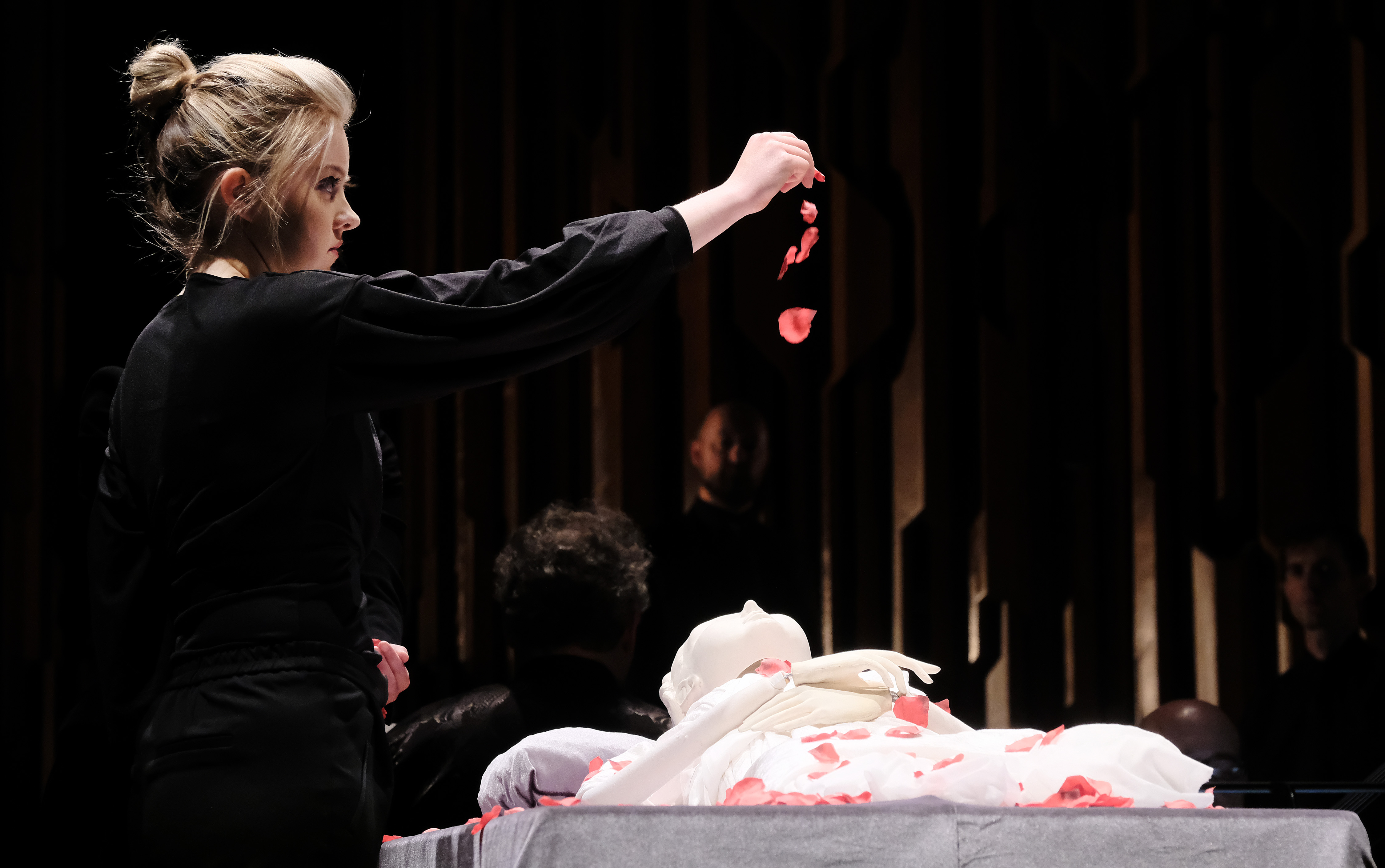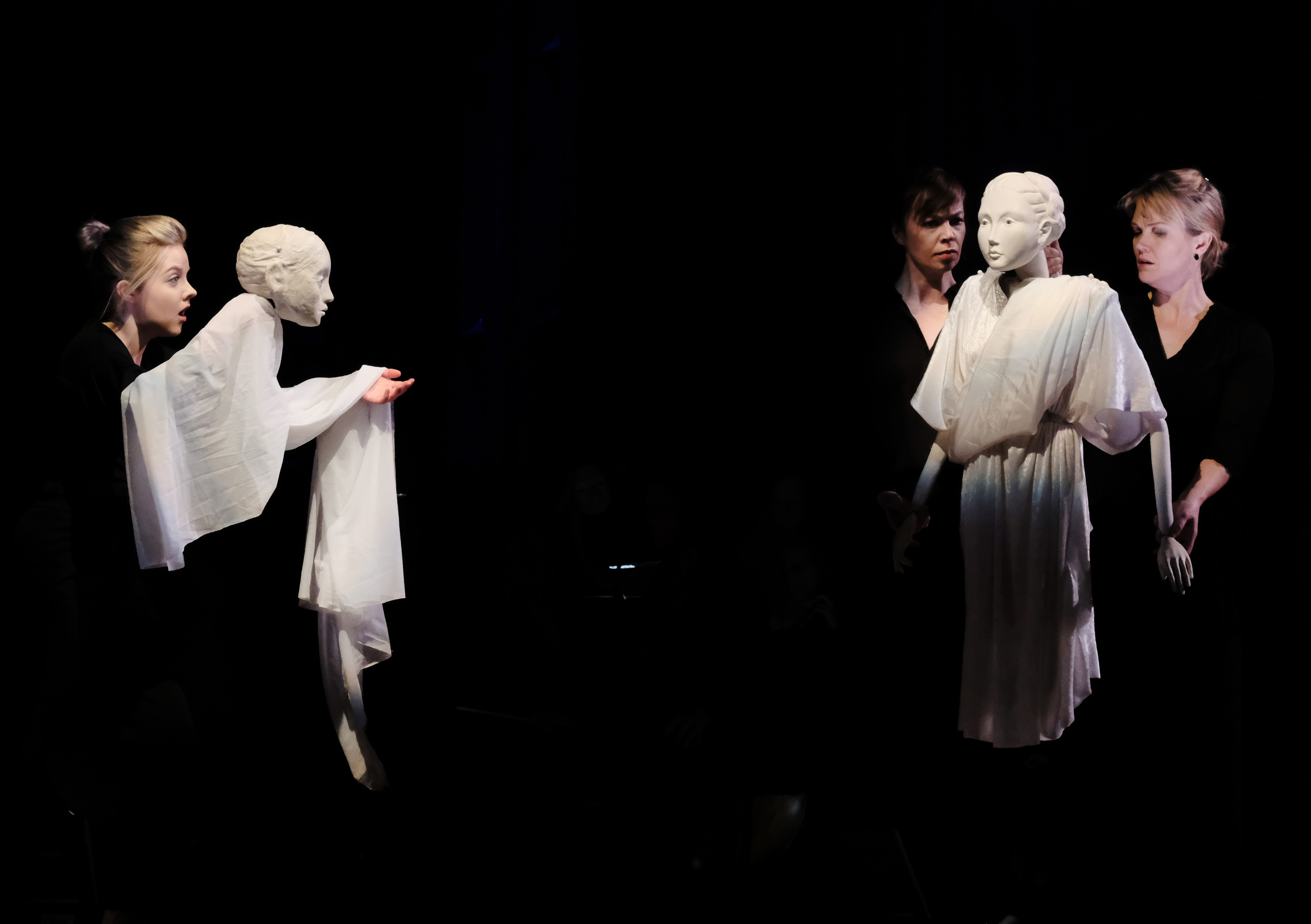Dido and Aeneas, Academy of Ancient Music, Barbican review – prosthetic passions | reviews, news & interviews
Dido and Aeneas, Academy of Ancient Music, Barbican review – prosthetic passions
Dido and Aeneas, Academy of Ancient Music, Barbican review – prosthetic passions
Puppetry, Handspring-style, helps give new life to Purcell's tragedy
“War Horse has a lot to answer for,” grumbled, or joked, my neighbour as the white-draped and white-faced puppet of the Queen of Carthage lay crumpled on the floor at the close of Thomas Guthrie’s semi-staged production of Dido and Aeneas. Well, not just War Horse.
How odd, but gratifying, to see the Kentridge-Handspring reinvention of puppetry as a weapon of radical theatre during and after the apartheid era in South Africa evolve into a smart way to refresh the conventions of Baroque opera. Guthrie, a singer turned director, has previously enlisted our wooden friends to enrich works such as The Magic Flute and Schubert’s Winterreise. At the Barbican, in a staging which preceded Purcell’s chamber opera (or operatic masque) with a first half that consisted of a newly-devised “funeral for the Queen of Carthage”, the puppets – created by Laura Caldow and Ben Thompson – certainly proved their dramatic worth. But they also set a stiff test for their human partners.
In the manner of the Handspring pioneers, Guthrie has his singer-actors hold and work their (fairly hefty) doubles while they perform. Caitlin Hulcup’s Dido and Ashley Riches’s Aeneas both had – slightly distracting – helpers to share the burden of moving their puppet characters, whereas the fine-toned Rowan Pierce, as Belinda, had to manage on her own. Although the singers coped with this extra task with admirable agility, it may take time – of which such a compact piece has little to spare – before the audience adjusts to the eloquent presence of these ghostly twins. However, Guthrie has realised that, for such a work, the singer-worked puppets can render a vital service. Connected (in every sense) to the singer but still separate entities, they bridge the gap between the intense, visceral emotions conveyed by Purcell’s gloriously subtle score and the alien norms and forms of his genre. Singers can’t aspire to “act” naturalistically in Baroque music-theatre as they would in modern Verdi or Puccini. The puppets, which Guthrie dubs “transitional objects, magical engagers of our imaginations”, paradoxically make the drama more human while the singers flesh it out in sumptuous sound. 
Puppet-free for now, the principals anticipated the tragedy to come in their tense interaction during the songs – above all, in Pierce and Riches' gorgeous duet “Close thine eyes and sleep secure”. But, if the more theatrical touches failed to interfere with the music in this part, they hardly added all that much either. Directed from the harpsichord by Richard Egarr, the AAM showed with poise and flair how Purcell’s writing dances with extraordinary grace and inventiveness over the chugging bass lines underneath. Hats off, in particular, to the two theorbos of William Carter and Eligio Luis Quinteiro, with their celestial raindrops of sound.
In Dido and Aeneas itself, the puppets didn’t entirely steal the show. Guthrie filled the stage, keeping the chorus on their toes and ever-mobile. No standing around at Dido’s court. He lent a Broadway-musical air of swagger and fun to the numbers for gangs of sailors and witches with which Purcell breaks up the ecstasy and agony of Aeneas’s abandonment of Dido. The chorus, and minor solo roles, had mini-puppets of their own: more like masks with flowing costumes attached. Bass-baritone Neal Davies brought a lip-smacking, pantomime dame mischief to the part of the Sorceress who conspires to lure Aeneas back to Rome.
The hero himself must play second fiddle here, but Riches’ stalwart baritone had both force and finesse. A late replacement for Christine Rice, Australian mezzo Hulcup gamely made her puppet double live, move, and suffer, while she sang with unerring control and an emotional fluency in no way impeded by her additional job. Make Dido act so vigorously, as the puppet-animator must, and you emphasise her agency as an independent queen who in some sense chooses her fate, not just a passive, lovelorn victim. Guthrie says that he took inspiration from the willed solitude of Elizabeth I. 
The future of Arts Journalism
You can stop theartsdesk.com closing!
We urgently need financing to survive. Our fundraising drive has thus far raised £49,000 but we need to reach £100,000 or we will be forced to close. Please contribute here: https://gofund.me/c3f6033d
And if you can forward this information to anyone who might assist, we’d be grateful.

Subscribe to theartsdesk.com
Thank you for continuing to read our work on theartsdesk.com. For unlimited access to every article in its entirety, including our archive of more than 15,000 pieces, we're asking for £5 per month or £40 per year. We feel it's a very good deal, and hope you do too.
To take a subscription now simply click here.
And if you're looking for that extra gift for a friend or family member, why not treat them to a theartsdesk.com gift subscription?
more Opera
 Carmen, English National Opera review - not quite dangerous
Hopes for Niamh O’Sullivan only partly fulfilled, though much good singing throughout
Carmen, English National Opera review - not quite dangerous
Hopes for Niamh O’Sullivan only partly fulfilled, though much good singing throughout
 Giustino, Linbury Theatre review - a stylish account of a slight opera
Gods, mortals and monsters do battle in Handel's charming drama
Giustino, Linbury Theatre review - a stylish account of a slight opera
Gods, mortals and monsters do battle in Handel's charming drama
 Susanna, Opera North review - hybrid staging of a Handel oratorio
Dance and signing complement outstanding singing in a story of virtue rewarded
Susanna, Opera North review - hybrid staging of a Handel oratorio
Dance and signing complement outstanding singing in a story of virtue rewarded
 Ariodante, Opéra Garnier, Paris review - a blast of Baroque beauty
A near-perfect night at the opera
Ariodante, Opéra Garnier, Paris review - a blast of Baroque beauty
A near-perfect night at the opera
 Cinderella/La Cenerentola, English National Opera review - the truth behind the tinsel
Appealing performances cut through hyperactive stagecraft
Cinderella/La Cenerentola, English National Opera review - the truth behind the tinsel
Appealing performances cut through hyperactive stagecraft
 Tosca, Royal Opera review - Ailyn Pérez steps in as the most vivid of divas
Jakub Hrůša’s multicoloured Puccini last night found a soprano to match
Tosca, Royal Opera review - Ailyn Pérez steps in as the most vivid of divas
Jakub Hrůša’s multicoloured Puccini last night found a soprano to match
 Tosca, Welsh National Opera review - a great company reduced to brilliance
The old warhorse made special by the basics
Tosca, Welsh National Opera review - a great company reduced to brilliance
The old warhorse made special by the basics
 BBC Proms: The Marriage of Figaro, Glyndebourne Festival review - merriment and menace
Strong Proms transfer for a robust and affecting show
BBC Proms: The Marriage of Figaro, Glyndebourne Festival review - merriment and menace
Strong Proms transfer for a robust and affecting show
 BBC Proms: Suor Angelica, LSO, Pappano review - earthly passion, heavenly grief
A Sister to remember blesses Puccini's convent tragedy
BBC Proms: Suor Angelica, LSO, Pappano review - earthly passion, heavenly grief
A Sister to remember blesses Puccini's convent tragedy
 Orpheus and Eurydice, Opera Queensland/SCO, Edinburgh International Festival 2025 review - dazzling, but distracting
Eye-popping acrobatics don’t always assist in Gluck’s quest for operatic truth
Orpheus and Eurydice, Opera Queensland/SCO, Edinburgh International Festival 2025 review - dazzling, but distracting
Eye-popping acrobatics don’t always assist in Gluck’s quest for operatic truth
 MARS, Irish National Opera review - silly space oddity with fun stretches
Cast, orchestra and production give Jennifer Walshe’s bold collage their all
MARS, Irish National Opera review - silly space oddity with fun stretches
Cast, orchestra and production give Jennifer Walshe’s bold collage their all
 Káťa Kabanová, Glyndebourne review - emotional concentration in a salle modulable
Janáček superbly done through or in spite of the symbolism
Káťa Kabanová, Glyndebourne review - emotional concentration in a salle modulable
Janáček superbly done through or in spite of the symbolism
